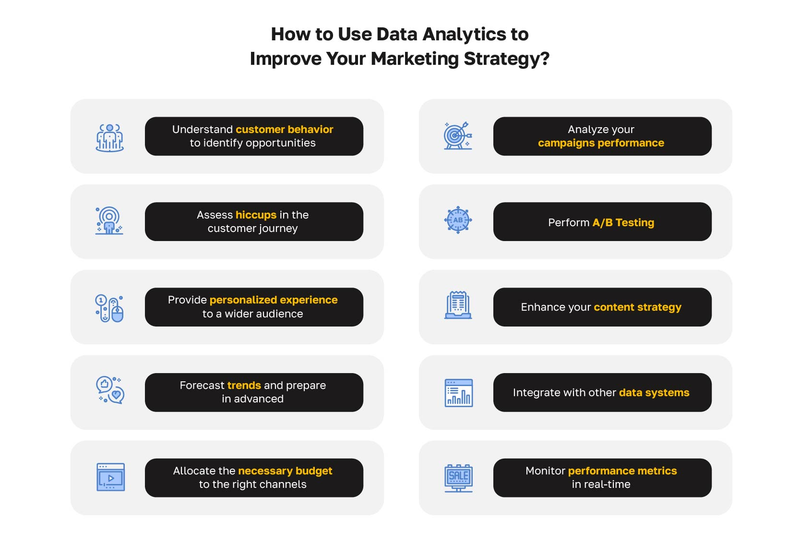Are you looking to unlock the full potential of your marketing efforts? Are you struggling to make sense of endless streams of metrics and analytics? You might feel frustrated, knowing the information is at your fingertips but not having the clarity or strategy to harness it effectively.
We’ve all faced these challenges at the beginning of our digital transformation journeys. With years of experience helping businesses transform raw data into actionable insights, WillDom is here to guide you on using data analytics to make smarter marketing decisions.
What Is Marketing Data Analytics?
Marketing data analytics is a practice that involves collecting, analyzing, and interpreting data to make informed marketing decisions. It uses statistical and computational techniques to extract meaningful patterns and insights from large data sets. It helps you understand the complete picture of your marketing efforts and their impact on your target audience.
Is Marketing Analytics in High Demand?
Yes, marketing analytics are in high demand. As businesses continue to move into digital spaces, the volume of data increases exponentially. Companies are looking for professionals who can collect large datasets, manage them, interpret them, and apply this information to improve marketing strategies.

How Can Data Analytics Help You Make Better Marketing Decisions?
Data analytics offers a lens through which marketers can clearly and precisely view their operations and consumer behaviors. This analytical approach allows businesses to refine their strategies, ensuring that data-driven insights back every decision.
Here are three ways data analytics can transform your approach and lead to more intelligent, more strategic marketing decisions:
#1 – Enhanced customer segmentation
Data analytics enables marketers to segment their audience more effectively by analyzing various data points, such as demographics, browsing behavior, purchase history, and social interactions. By understanding these segments, marketers can tailor their campaigns to target each group more accurately, increasing the relevance and effectiveness of their marketing efforts.
#2 – Optimization of marketing campaigns
Analytics allows marketers to measure campaign performance in real-time and adjust to maximize effectiveness. Data analytics provides insights into which channels perform best, what content resonates with the audience, and which campaigns lead to conversions. By analyzing this data, marketers can allocate resources more efficiently.
#3 – Predictive analytics for future planning
The predictive power of data analytics enables marketers to anticipate market changes, understand potential risks, and seize opportunities before they become apparent. Businesses can prepare more effective strategies, optimize inventory levels, and create marketing messages anticipating and meeting customer needs.
How to Use Data Analytics to Improve Your Marketing Strategy
With countless metrics, data sources, and analysis techniques, figuring out the best ways to use data analytics can feel like searching for treasure without a map. However, the multitude of options also means numerous opportunities to harness this data to refine and enhance your marketing strategies.
Here are ten ways you can leverage data analytics to improve your marketing strategy:

#1 – Understand customer behavior to identify opportunities
By analyzing customer data, marketers can understand how customers interact with their brand across various touchpoints. This involves studying browsing patterns, purchase behavior, and channel feedback to identify trends and preferences. With this insight, you can uncover new opportunities for engagement or product development.
#2 – Assess hiccups in the customer journey
It lets you map the customer journey and pinpoint areas where customers face difficulties or drop off. You can make targeted improvements to enhance the user experience by identifying these friction points. For instance, if data shows a significant drop in engagement at the onboarding stage, you could simplify this process to keep users interested and improve retention rates.
#3 – Provide personalized experience to a wider audience
Enables marketers to personalize experiences at scale. By understanding individual customer preferences and behaviors, you can create customized content, recommendations, and offers that resonate with each audience segment. This personalization can increase engagement and loyalty as customers feel the brand understands their needs.
#4 – Forecast trends and prepare in advanced
Predictive analytics uses historical data to forecast future trends and customer behaviors. This foresight allows marketers to be proactive rather than reactive, preparing campaigns and strategies that align with predicted market conditions. For instance, if data shows an increasing trend in eco-friendly products, a business can adjust its product lines and marketing messages to capitalize on this shift.
#5 – Allocate the necessary budget to the right channels
You can evaluate the performance of various marketing channels and allocate your budget accordingly. This ensures your marketing spend is optimized for the channels that generate the best ROI. For example, if analytics indicate that social media campaigns drive more qualified leads than paid search, you can redirect funds to enhance your social media presence.
#6 – Analyze your campaigns performance
Regular analysis of campaign performance helps identify what is working and what isn’t. You can refine and optimize your marketing efforts by evaluating key metrics such as conversion rates, click-through rates, and engagement levels. This continuous improvement cycle ensures your campaigns are always tuned for maximum impact.
#7 – Perform A/B Testing
You can determine which elements resonate best with your audience by testing different campaign versions. Data analytics supports A/B testing by providing the metrics needed to evaluate the effectiveness of each variant, allowing you to make data-driven decisions. For example, A/B testing can compare two different email subject lines to see which one yields a higher open rate.
#8 – Enhance your content strategy
Analytics can significantly improve your content strategy by revealing what types of content generate the most interest and engagement among your audience. By analyzing metrics like page views, shares, and time spent on a page, you can identify which topics and formats are most effective and adjust your content plan accordingly.
#9 – Integrate with other data systems
Integrating marketing data with other systems, such as sales, customer service, and operations, can provide a more holistic view of the business. This integration allows for a deeper analysis of how marketing activities impact other areas and can lead to more coordinated and strategic decision-making across the company.
#10 – Monitor performance metrics in real-time
By monitoring performance metrics as they happen, you can quickly identify and respond to changes in customer behavior or market conditions. This immediate insight allows for rapid campaign adjustments, ensuring that your marketing efforts are effective at any moment. For instance, if you notice a sudden spike in traffic from a specific source, you can immediately capitalize on this trend.
What is an Example of Marketing Data Analysis?
An example of marketing data analysis is a retail company using customer purchase history and website interaction data to create personalized product recommendations. By analyzing past purchases, browsing behavior, and demographic information, the company can identify customer patterns and preferences. This data is then used to tailor marketing campaigns to fit consumer needs.
What Do You Need to Apply Data Analytics
As businesses increasingly rely on data-driven decisions, it’s essential to be equipped with the necessary tools, skills, and strategies to turn data into actionable insights. Whether you’re just starting or looking to enhance your current analytics capabilities, you need crucial elements to ensure your data works for you.
Here’s what you need to apply data analytics successfully in your marketing strategy:
1. Choose your analytics tools
The foundation of any effective data analytics operation is the tools you use to gather, process, and analyze data. When selecting tools, consider factors such as the volume of data you need to process, the complexity of your analysis, and the specific insights you wish to gain.
2. Establish key performance indicators (KPIs)
Key Performance Indicators (KPIs) are the metrics you will use to measure the success of your marketing efforts and the impact of your initiatives. These should align with your overall business goals and provide clear benchmarks for success. Common KPIs in marketing include conversion rates, click-through rates, customer acquisition cost, customer lifetime value, and ROI.
3. Collect and filter your data
Data collection is gathering information from various sources that will be analyzed to derive insights. This can include data from customer interactions, web analytics, social media, CRM systems, and more. However, not all data is valuable. Filtering your data involves cleaning and refining it to ensure you work with the most relevant and accurate information.
4. Analyze and interpret data
Analyzing and interpreting the data to extract actionable insights involves applying statistical methods and analytics models to understand patterns, relationships, and trends within your data. Techniques can range from basic descriptive statistics, like averages and variances, to more complex predictive and prescriptive analytics.

We Can Help You Take Your Marketing Efforts to the Next Level!
Trying to extract meaningful insights from unstructured data sets requires a significant amount of time and dedication. Many businesses struggle to connect the dots between data collection and strategic implementation, leading to missed opportunities. An alternative most companies find preferable is to seek professional help to integrate data analytics into their marketing strategies.
That’s where WillDom comes in. With a team of experienced analysts and state-of-the-art tools, we specialize in transforming complex data into clear, actionable insights. By partnering with WillDom, you’ll access expert knowledge and innovative solutions that streamline your marketing strategy and improve your ROI. Don’t let the complexities of data overwhelm you!
Contact WillDom today to reach success with our comprehensive data analytics services!

